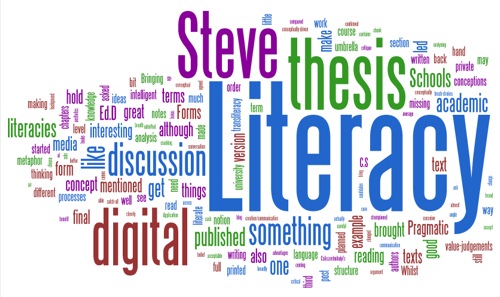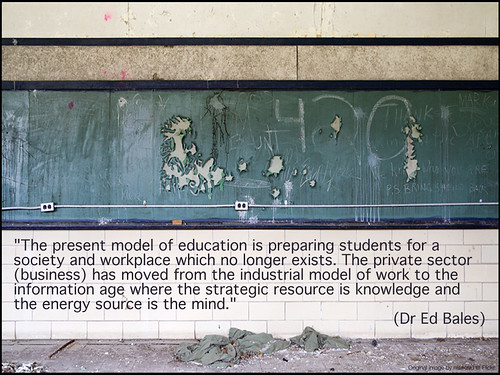
A week ago I had a Skype meeting with my Ed.D. thesis supervisor, Steve Higgins. He’s a great guy and a breath of fresh air compared to my previous one. Steve’s full of great ideas, willing to listen to mine, and is very flexible. I’m pleased with his guidance and supervision thus far! 😀
This blog post is mainly for my own benefit, to summarise where I’m headed with my thesis. If you find it interesting – well, that’s a bonus… :-p
Literacy as metaphor?
We started our discussion by talking about literacy as a metaphorical concept as opposed to one that can be supposed to be objectively ‘real’. Both Steve and I are coming at the thesis from a Pragmatic angle, so we would hold that literacy, even as metaphor, is a valid concept if it is, in the words of William James, ‘good in the way of belief’. Pragmatists also hold that something is true if it ‘works’ and has some type of ‘cash value’. I’ll explain this in full in the thesis proper!
I then brought up the distinction, made by Hannon (2000: 23) about the literac(ies) involved in making a text and then in the communication of that text. This led to us discussion the notion of ‘digital fluency’.
What’s missing from ‘digital literacy’?
I, and those authors whom I’ve read, have been keen to see overlaps between ‘traditional’ literacy (involving processes and knowledge related to books and printed matter), and what can be termed ‘digital’ literacy (processes and knowledge relating to screens and virtual environments). Steve questioned what was missing from the digital version of literacy, what’s outside the overlap. I brought this back to the creation/communication dichotomy, which should make for an interesting discussion in the final thesis! 🙂
We touched on the notion of possible advantages of letter-based, printed text in that they are tightly-defined and slow to change. This means, for example, that although we have some difficulty in reading texts written in Old English, the average reader can quite easily make sense of texts from the last few hundred years. Does the same hold for digital ‘texts’ requiring digital literacies? 😮
Forms of literacy as ‘umbrella terms’
I mentioned to Steve that I’ve noticed almost every proponent of a form of literacy (digital literacy, visual literacy, media literacy, etc.) tends to conceive it as an ‘umbrella’ catch-all term that other literacies fit into. An example of this would be ‘transliteracy’, as championed by Thomas, et al. (2007):
Our current thinking (although still not entirely resolved) is that because it offers a wider analysis of reading, writing and interacting across a range of platforms, tools, media and cultures, transliteracy does not replace, but rather contains, “media literacy” and also “digital literacy.”
This led into a discussion of Semiotics and the work of C.S. Peirce – something I need to revisit after studying in some depth during the third year of my Philosophy degree!
Literacy and value-judgements
From a discussion of my trying to identify a ‘third space’ (my notes are a little sketchy here), Steve brought up the fact that ‘literate’ used to me ‘cultured and well-read’. This, of course, includes a value-judgement and an elision between two separate conceptions.
This then led to my raising a few questions as to the sphere in which literacy practices can be said to operate. On the one hand, you don’t want a definition of a form of literacy that asks too much of an individual – otherwise virtually no-one can be said to be literate in that way. But on the other hand, ask too little and the term is meaningless.
It was here that the link to the Pragmatic method was strongest in our conversation. Steve reminded me of Wittgenstein’s ‘private language’ argument: just as it is impossible to have a language that is private, so a literacy has to make a difference in practice.
Schools and digital literacy
Bringing things back to more mundane and structural issues, I shared my worry that I wouldn’t be able to do my planned final section of the thesis any justice. Whilst still a purely conceptual thesis, I’d planned to bring my studies down to a more practical level to explore what schools could do in order to promote ‘digital literacy’. Steve reassured me that painting this in broad brush-strokes would be sufficient. He asked whether I was planning to organize the thesis historically, conceptually, or in some other manner. I’m currently thinking that I’ll be bringing in some elements of how terms and ideas have developed historically-speaking, but in order to gain the rigour and critical analysis required at Ed.D. level, the thesis will be mostly conceptually-driven.
Thesis structure
After some negotiation and discussion, Steve and I have agreed on broadly the following structure to my Ed.D. thesis:
- Literacy (what is literacy? -> multiple literacies -> functional literacy)
- ‘Digital literacy’ (literature review -> critique -> value-judgements)
- Pragmatic methodology (what is the ‘core’ of definitions? -> what would an acceptable form look/feel like?)
- ‘Flow’ (Csikszentmihalyi’s seminal work -> C.S. Peirce’s ‘dancer & dance’ -> ‘at one’ -> physical relation to technology (spatiality) -> aesthetics -> functionality -> figure & ground -> can only see something against background – i.e. what it’s not)
- Application to schools (how can schooling be made better (effective/efficient) ->how can culture be changed -> schools as making/shaping -> purpose of education -> Labour govt. (1997) & tension between economy & personalising learning)
Where do I go from here?
I could actually spend forever and a day reading and making notes on some great authors who have written some very intelligent and interesting things on conceptions of literacy. However, needing to get cracking, I asked Steve how I should get started. He said that he liked the look of my concept map and that, after tidying it up a bit (and tying it more closely to my proposed chapters) I should choose a chunk to ‘get my teeth’ into. This should be a section – such as a discussion of different forms of literacy – that will definitely feature in the final thesis.
Publication and university requirements
Steve admitted that the University of Durham isn’t the most forward-thinking when it comes to the submission of theses. Although they will accept electronic documents with embedded hyperlinks, they may be a bit wary of wikis, for example. I also need to be careful, in theory, about how much of my thesis is ‘published’ prior to my submitting it. Of course, in this day-and-age, ‘published’ can mean many and varied things. Steve is of the opinion that so long as most chapters haven’t been published by academic journals, I should be fine.
I mentioned that I’d like to be published in an academic journal whilst I’m writing my thesis and Steve confirmed this would be a good idea. The sections on analysing different forms of literacies and how the terms have evolved as well as the philosophical underpinnings of digital literacy may be good candidates for this.
Finally, I mentioned to Steve that I’d like to publish – probably self-publish through something like Lulu.com – a less academic version of my thesis. I’d like something the intelligent non-specialist could pick up, read, enjoy and get something from. Steve said I should focus on the academic version first, as that’s where my (and his!) priorities lie. 😉


 I’m not a huge fan of spending money on software and digital services. There’s a couple of reasons for this. The first is that I’m an advocate of
I’m not a huge fan of spending money on software and digital services. There’s a couple of reasons for this. The first is that I’m an advocate of 
![Reblog this post [with Zemanta]](http://img.zemanta.com/reblog_e.png?x-id=2dc2a172-ebae-4998-8bf8-84dda2fe1022)